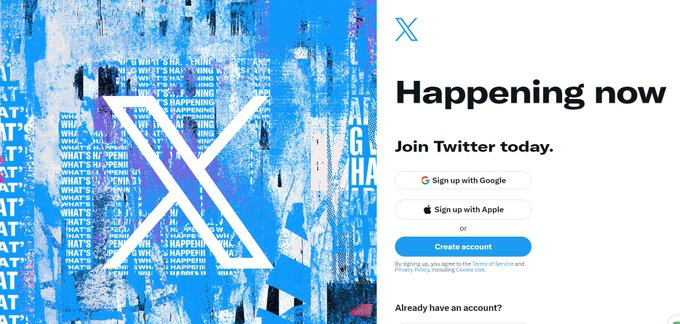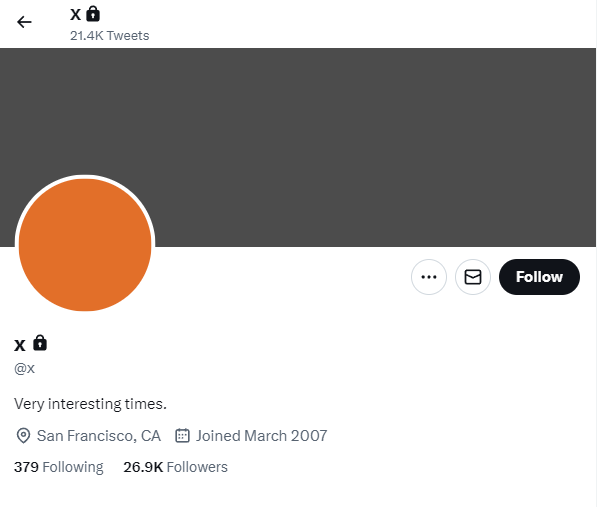So Twitter, at least in name, is no more, or at least, it’s no more in the eyes of Elon Musk and his crew, who are now working to change every appearance of the iconic bird logo in the app to a Unicode X, which Elon has adopted as the new logo for his re-imagined X app.
So what does that mean for your strategy, what are tweets now called, and how will this change things moving forward?
Here’s a look at some of the top questions about the re-imagining of tweets, which is in line with Elon’s long-held dream.
Why is Twitter now called ‘X’?
The origins of X stem back to the late nineties, when Elon was first making a name for himself as the founder of a payments start-up. That start-up was going to be called X.com, a name that Elon pushed for even after his company was acquired by PayPal, which was part of his grander vision to create a payments and banking backbone for a much larger website, which would then facilitate all kinds of transactions, using simplified funds transfer as the starting point.
Conceptually, X.com would have been similar to how Chinese web users interact via WeChat, with all of your banking processes built-in, which then makes it much more convenient to shop, pay bills, order food, etc. Essentially, once all of your finance activities are contained within a single app, that then leads to natural growth in other payment opportunities, which is what’s now made WeChat a critical connector for over a billion Chinese users.
Back in 1999, this was a revolutionary concept, and it was Elon’s vision to expand PayPal beyond what it would eventually become, and to build this dominant super app. But it never happened. Elon left PayPal to focus on other projects, and his X idea was shelved, until last year, when he purchased Twitter, and immediately re-awakened his dreams of an ‘everything app.’
Now, Musk claims that Twitter, with its 252 million users, is an ‘accelerant to X’, using the network effects and popularity of the app to branch out into these expanded elements.
Whether that plan remains as viable in 2023 as it was in 1999 is not entirely clear, but this is the thinking, and the reasoning behind the X name change at the app.
What changes are coming to the app?
Well, right now, as noted, Twitter’s seemingly in the process of changing all of the bird icons in the app into the new X logo, which Musk effectively commissioned from a Twitter user over the weekend.
Once Musk had chosen from a range of user-submitted concepts for the new X icon, he then set his team to work in updating the app, which is why the X is now appearing in various elements, though most still include references to Twitter, tweeting, tweets, etc.

Given the sheer scope of such references, it’s going to take some time for Twitter to fully update its branding, while Musk has also flagged a coming update that will switch the app to black as the default color base, as opposed to the well-known Twitter blue.
That’ll gradually erase the years of brand equity that Twitter had established, but if Musk wants a clean start, then it could be a necessary step, in order to transform the app into something new, and differentiate it from its past.
Many analysts have questioned this decision, and the impacts that it’ll have on the business. But Elon, as always, is going to go about things in his own way.
Musk even laughed off the suggestion that he would need to use brand consultants to change the app’s branding.
Though that approach, in charging ahead, then dealing with the consequences at a later stage, could also end up causing some big headaches for the X team.
How long will the rebranding take?
It’s starting to look like it’s going to take some time, as the newly named entity grapples with various trademarks and other requirements to officially alter its name.
In Japan, for example, one of Twitter’s key markets, X is also the name of a well-known rock band, and it owns the rights and trademarks to most commercial usage of the title, which could complicate the new branding push. Most cases of this type are only a major concern when the two entities seek to operate in similar markets, but in terms of brand usage, it could make it hard for X the app to gain the approval that it needs in all respects.
Microsoft and Meta also own varying ‘X’ trademarks related to different products, which could encroach on some of Musk’s plans, and further limit its usage, while Twitter itself seemingly hasn’t sought to acquire the actual @x handle in the app, which is evidently still controlled by another user.

The Microsoft/Meta case, in particular, could end up being a big hurdle, especially given Musk’s recent back-and-forth with Meta chief Mark Zuckerberg, because Meta’s X trademark relates specifically to streaming content, messaging, and chat rooms.
There are seemingly various legal determinations that would need to take place to enforce Meta’s right to claim any misuse on Musk and Co’s part, especially given that the X icon is such a common symbol in online usage. But Meta could well make things very difficult for the Twitter re-brand, by simply pushing its case, which, at the least, could delay the already messy roll-out.
There are also other complications in terms of re-writing contracts, re-establishing existing deals, and clarifying legal wording. A lot of this was already updated back in April, when Musk officially changed the name of Twitter’s parent company to X Corp. But it will all take time to clarify, so we may still be seeing at least some bird references in the app for many months yet.
Some analysts have also speculated that the name change could be part of an attempt by Musk and his team to side-step some legal complications, by effectively claiming that ‘Twitter’ no longer exists, though that’s unlikely to hold up in most, if not all of the cases that have been brought against the organization.
But maybe that’s another element in play, which will add to the broader transition.
So what do we call tweets now?
According to Elon Musk, tweets should be referred to as x’s.
Not sure that’s going to catch on, while there’s no real extension of that which could be applied to re-tweets, or any of the other verbs and adverbs which have become common, understood references to Twitter use.
Which is another element that will be tough for Twitter to shake, that users are going to come to the app with their own expectations and lingo, and you can’t just change that by deciding you want a new icon and a new name.
But Elon is confident that user habits will shift, as the new branding gradually takes effect.
So get used to posting x’s and re-exing those x’s in the X app. Or something along those lines.
Will Elon’s grand plan for X really work?
This is the big question. As noted, Elon’s original plan for X, back in 1999, made some sense, but since then, many social media platforms, as well as other apps, have tried and failed to integrate payments and shopping, and it’s just never happened, due to regulatory limitations, lack of user interest, flawed system integrations, etc.
Try as platforms might, getting the necessary approvals to facilitate payments, and effectively side-step existing banking systems, is not something that regional governments take lightly, due to related safety concerns, pressure from influential industry groups, rising rates of online fraud, and more.
Meta, for example, has been trying for years to facilitate universal payments, and has faced major pushback at almost every turn, and as such, it’s difficult to imagine Elon Musk, who’s become an increasingly divisive political figure, and who also has a vested interest in several industries, getting the green light from these same authorities as he begins his payments push.
Maybe, back in the early days of payments, when Musk was most closely connected to the ins and outs of the industry, this was easier, but it doesn’t seem like this is going to be the clear path that the X team seems to envision, at least at this stage.
And that’s before we even get a sense of whether Twitter/X users actually want this.
As most apps have found, despite giving people more options to shop in-stream, Western audiences haven’t shown a lot of interest, which is in variance to Asian markets, where in-app shopping has become a transformative trend.
That could be due to enhanced government control. Financial markets in China are tightly regulated by local authorities, which means that even your online transactions are overseen by banking providers, whereas Musk and Co. want to create a separate transactional system, which wouldn’t be beholden to the same rules as existing banks.
That’s risky, potentially too risky for most regulators to tick off, while consumers are unlikely to have the same trust in such systems, especially after the recent collapse of the broader crypto sector.
Musk and his team aren’t necessarily looking to embrace cryptocurrency to fuel their push (at least, not yet), but the optimistic enthusiasm for an alternative payment process, which eventually led to many regular consumers losing out big time, will increase hesitancy in new payment processes that don’t have the backing of established providers and their trusted systems.
Maybe, over time, this could become a thing. Yet, even then, the plan for X remains very vague.
According to Musk and X CEO Linda Yaccarino, X will facilitate payments and banking, which will then enable every type of transaction to be managed on the platform. And those transactions will just happen on X because they can?
There are already plenty of other ways to facilitate transactions, I don’t see how this platform will be transformative in this respect.
But, whatever the reason, Twitter is seemingly now in its final days, as the doors creak open on a new era at the app.
What that era will be, no one knows.



